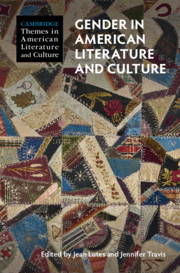Book contents
- Gender in American Literature and Culture
- Cambridge Themes in American Literature and Culture
- Gender in American Literature and Culture
- Copyright page
- Contents
- Contributors
- Acknowledgments
- Introduction
- Part I Intimacies
- Chapter 1 The Price of Freedom
- Chapter 2 Post-Reproductive Female Sexuality and the Early American Novel
- Chapter 3 The Effeminate Man in Nineteenth-Century America
- Chapter 4 Rereading Puritan Masculinity through Trans Theory
- Chapter 5 “Unbounded Grief”
- Chapter 6 Rethinking Reproductive Freedom through Transpacific Narratives
- Chapter 7 Slow Emergency
- Part II Aggressions
- Part III New Directions
- Bibliography
- Index
Chapter 6 - Rethinking Reproductive Freedom through Transpacific Narratives
from Part I - Intimacies
Published online by Cambridge University Press: 01 April 2021
- Gender in American Literature and Culture
- Cambridge Themes in American Literature and Culture
- Gender in American Literature and Culture
- Copyright page
- Contents
- Contributors
- Acknowledgments
- Introduction
- Part I Intimacies
- Chapter 1 The Price of Freedom
- Chapter 2 Post-Reproductive Female Sexuality and the Early American Novel
- Chapter 3 The Effeminate Man in Nineteenth-Century America
- Chapter 4 Rereading Puritan Masculinity through Trans Theory
- Chapter 5 “Unbounded Grief”
- Chapter 6 Rethinking Reproductive Freedom through Transpacific Narratives
- Chapter 7 Slow Emergency
- Part II Aggressions
- Part III New Directions
- Bibliography
- Index
Summary
This chapter reconsiders mainstream conceptualization of reproductive freedom through examining Japanese North American writer Ruth Ozeki’s My Year of Meats (1998).By foregrounding historical power relations that have shaped US relations with Asia and the Pacific, Ozeki’s novel unsettles conventional tropes of reproduction and respectable domesticity. Specifically, the novel illuminates how these tropes reinforce structural inequalities obscured by the discourse of multiracial reproductive futurity and insists that the fatal consequences of US racial reproduction must be understood as a function of settler colonial capitalism that operates within the United States and beyond. Within this context, the novel maps the uneven effects of transnational settler colonial heteropatriarchal power, which entail both segregation and conflicts as well as unlikely affinities that might be transient yet persist in its emergence.
Keywords
- Type
- Chapter
- Information
- Gender in American Literature and Culture , pp. 96 - 109Publisher: Cambridge University PressPrint publication year: 2021

